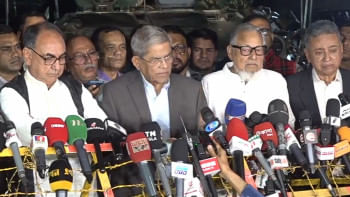Wage growth below inflation for 21st straight month

Abdul Khaleq works in Dhaka as a carpenter under a local contractor for eight hours per day, earning Tk 500.
But his regular duties are not enough to meet the living expenses of his five-member family.
As a result, he has to do more than three hours of overtime every day to get an additional Tk 250.
Even then, he finds it hard to make ends meet.
"It is tough to maintain a family of five with this income," said Khaleq, who hails from Sirajganj and is the lone breadwinner in his family.
"Every month, I have to borrow some money to meet family expenses. Last month, I had to take a loan of Tk 2,000," he said.
"The price of everything has increased but our income didn't increase at the same pace. Around six months ago, my wage increased by Tk 50 only."
Mojnu Mia, a human haulier driver who lives in a mess in Mirpur's 60-Feet Road, added: "I cannot dare to bring my family to Dhaka in fear of the costs."
Yesterday, the reporter visited the location and found Mojnu driving along his designated route without a hired helper.
"If I were to hire a helper, I would have to pay around Tk 400 to him. After paying that and around Tk 1,300 to the vehicle's owner, I wouldn't have enough money to afford my family's living expenses," he added.
The recent political unrest has compounded their woes as the number of passengers has decreased.
"It's difficult to find a job now. If political unrest persists, it will hamper us seriously," said Rajib Hossain, who works as a helper on human hauliers on the same route.
Wages grew by 7.69 percent for low and unskilled workers in October, which was 2.24 percentage points below the inflation rate of 9.93 percent for the month, data from the Bangladesh Bureau of Statistics (BBS) showed.
This means wage growth has been behind the inflation rate for the past 21 months since February 2022.
Analysts say the widening gap between the inflation rate and the wage growth rate is forcing low-income and unskilled workers to cut consumption amid falling real incomes and rising costs of living.
Rizwanul Islam, former special adviser for employment at the International Labour Office in Geneva, said real wages have been falling for nearly two years now.
"This is an issue of concern," he said.
The distress caused by rising prices is affecting not only the poor but also lower middle-income groups, he said.
In terms of how to tackle inflation while moving forward, Islam said raising the interest rate was commonly suggested as a tool for tackling inflation.
But this is based on the assumption that price increases have been caused by excess demand for commodities, which may not always be the case, he said.
"The rising price of food items in Bangladesh is an example," he added.
"It will be difficult to fight the current inflation in the country by raising the interest rate. Supply management will be crucial.
"It is also important to remember that as there has not been a one-off devaluation of the domestic currency, rather the exchange rate is depreciating continuously. As long as this continues, domestic prices of imported goods will continue to rise. So, we are not likely to see a notable decline in inflation soon."
He suggested restoring macroeconomic stability as quickly as possible and expanding the coverage of social safety nets.
Talking to The Daily Star, Mustafizur Rahman, a distinguished fellow of the Centre for Policy Dialogue (CPD), said the government's failure in market management was one of the key factors behind the elevated level of inflation for the past one-and-a-half years.
Rahman said the agriculture ministry regularly publishes the production cost of 15 products, including potatoes, rice and jute.
It shows that the price of products increases at least four-fold and as much as 15-fold by the time it reaches the retail market.
"This kind of monopoly market system does not exist anywhere else in the world."


 For all latest news, follow The Daily Star's Google News channel.
For all latest news, follow The Daily Star's Google News channel. 



Comments